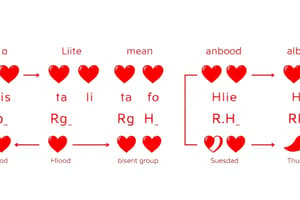Podcast
Questions and Answers
Which blood group type contains both anti-A and anti-B antibodies?
Which blood group type contains both anti-A and anti-B antibodies?
- Type A blood
- Type B blood
- Type O blood (correct)
- Type AB blood
What is the most clinically significant antigen in the Rhesus blood group system?
What is the most clinically significant antigen in the Rhesus blood group system?
- D antigen (correct)
- C antigen
- E antigen
- Kell antigen
In the ABO blood group system, which type of blood has no agglutinins?
In the ABO blood group system, which type of blood has no agglutinins?
- Type AB blood (correct)
- Type O blood
- Type A blood
- Type B blood
How many blood group systems have been identified to date?
How many blood group systems have been identified to date?
What type of antibodies would a person with Type A blood produce?
What type of antibodies would a person with Type A blood produce?
What determines if a person is classified as Rhesus positive?
What determines if a person is classified as Rhesus positive?
Which population has the highest prevalence of Rhesus negative individuals?
Which population has the highest prevalence of Rhesus negative individuals?
Under which circumstance are anti-D antibodies produced in a Rhesus negative person?
Under which circumstance are anti-D antibodies produced in a Rhesus negative person?
What is a major consequence of erythroblastosis fetalis?
What is a major consequence of erythroblastosis fetalis?
What characteristic describes the IgG anti-D antibodies produced by a Rhesus negative mother?
What characteristic describes the IgG anti-D antibodies produced by a Rhesus negative mother?
Which statement is true regarding the inheritance of the Rhesus factor?
Which statement is true regarding the inheritance of the Rhesus factor?
What typically occurs to the first baby of a Rhesus negative mother carrying an Rh positive baby?
What typically occurs to the first baby of a Rhesus negative mother carrying an Rh positive baby?
Which alleles are involved in determining a person's ABO blood type?
Which alleles are involved in determining a person's ABO blood type?
What blood type would a person with genotype AO have?
What blood type would a person with genotype AO have?
What occurs if anti-A antibodies come into contact with A antigens?
What occurs if anti-A antibodies come into contact with A antigens?
Which blood type is considered the universal donor for red blood cell transfusions?
Which blood type is considered the universal donor for red blood cell transfusions?
What is necessary for compatibility testing before a blood transfusion?
What is necessary for compatibility testing before a blood transfusion?
What would be the blood type of an individual with genotype BB?
What would be the blood type of an individual with genotype BB?
What happens during a wrong blood transfusion?
What happens during a wrong blood transfusion?
Which blood type can receive blood from any ABO type without a risk of agglutination?
Which blood type can receive blood from any ABO type without a risk of agglutination?
Flashcards
Blood Groups
Blood Groups
A system used to classify blood based on the presence or absence of specific antigens on red blood cells.
ABO Blood Group System
ABO Blood Group System
The most important blood group system, based on the presence of A and B antigens on red blood cells.
Blood Type A
Blood Type A
Has A antigens on red blood cells and anti-B antibodies in the plasma.
Blood Type B
Blood Type B
Signup and view all the flashcards
Inheritance of Blood Groups
Inheritance of Blood Groups
Signup and view all the flashcards
A Allele
A Allele
Signup and view all the flashcards
B Allele
B Allele
Signup and view all the flashcards
O Allele
O Allele
Signup and view all the flashcards
Blood Transfusions
Blood Transfusions
Signup and view all the flashcards
Agglutination
Agglutination
Signup and view all the flashcards
Universal Donor
Universal Donor
Signup and view all the flashcards
Universal Recipient
Universal Recipient
Signup and view all the flashcards
Rhesus Factor
Rhesus Factor
Signup and view all the flashcards
Rh Positive
Rh Positive
Signup and view all the flashcards
Rh Negative
Rh Negative
Signup and view all the flashcards
Anti-D Antibodies
Anti-D Antibodies
Signup and view all the flashcards
Haemolytic Disease of the Newborn (HDN)
Haemolytic Disease of the Newborn (HDN)
Signup and view all the flashcards
First Pregnancy
First Pregnancy
Signup and view all the flashcards
Subsequent Pregnancies
Subsequent Pregnancies
Signup and view all the flashcards
Study Notes
MD137 Haematology - Lecture 4: Blood Groups
-
Blood groups are determined by antigens on red blood cells, which can react with antibodies from other individuals
-
Clinically important blood groups: ABO and Rhesus
-
ABO system inheritance involves 3 alleles (A, B, O):
- A allele codes for the A antigen
- B allele codes for the B antigen
- O allele produces no antigen (non-functional)
- A and B are dominant, O is recessive
- Determining blood type involves inheriting one allele from each parent
-
ABO Blood Types:
- A blood type has A antigens and anti-B antibodies
- B blood type has B antigens and anti-A antibodies
- AB blood type has both A and B antigens and no antibodies
- O blood type has no antigens and both anti-A and anti-B antibodies
-
Rhesus system:
- Over 50 antigens exist, but D antigen (Rhesus factor) is most important
- Rh positive individuals have the D antigen on their red blood cells
- Rh negative individuals lack the D antigen
-
Blood Transfusions:
- A "wrong" transfusion can lead to agglutination (clumping) and hemolysis of red blood cells
- Blood compatibility testing is essential to prevent serious complications like agglutination or hemolysis when transfusing blood.
- Universal donor: Blood type O
- Universal recipient: Blood type AB
-
Haemolytic Disease of the Newborn (HDN):
- HDN occurs when a Rh-negative mother carries a Rh-positive fetus
- During pregnancy, exposure to fetal Rh factors can cause the mother to develop anti-Rh (anti-D) antibodies
- Subsequent pregnancies with Rh+ fetuses can lead to these antibodies crossing the placenta and attacking the fetal red blood cells, causing complications
- RhoGAM, a medication that neutralizes the antigens, is used to prevent HDN
-
Prevention:
- RhoGAM is used prophylactically in Rh-negative women to prevent HDN during pregnancy to reduce risk associated with subsequent pregnancies.
Learning Objectives
- Students should learn what blood groups are and how they are inherited
- Key blood groups, their antigens and antibodies for the ABO and Rhesus systems
- How these systems are crucial for blood transfusions
- Understanding Rhesus system's importance and role in relation to potential complications such as haemolytic diseases in newborns
Studying That Suits You
Use AI to generate personalized quizzes and flashcards to suit your learning preferences.
Related Documents
Description
Explore the intricate details of blood groups in this quiz that covers the ABO and Rhesus systems. Understand how blood type inheritance works and the significance of antigens and antibodies. Test your knowledge on blood type classifications and their clinical relevance.




